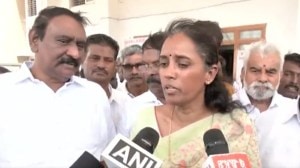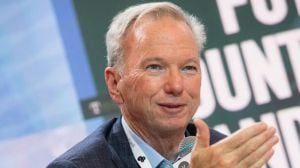Be a player,not a potato
One thing that wont change in Indias foreign policy for the next decade is the absolute centrality of our ties with Islamabad,Beijing and Washington....
One thing that wont change in Indias foreign policy for the next decade is the absolute centrality of our ties with Islamabad,Beijing and Washington. What is new at the turn of the decade,however,is the prospect of instability in all the three relationships.
Indias ability to manage them will depend entirely upon the UPA governments ability to learn from the diplomatic opportunities lost and the mistakes made in its first term. Although Indias own relative position in the world had steadily improved during the last decade,the Congress party led by Sonia Gandhi and the UPA government led by Manmohan Singh had come up short on strategic self-confidence and organisational competence.When the UPA came to power in May 2004,it inherited an exceptionally positive foreign policy legacy from the NDA led by Atal Bihari Vajpayee. In the short span of six years,Vajpayee had boldly altered the direction of Indias foreign policy,especially towards the US,Pakistan and China.
Vajpayees decision to conduct five nuclear tests in May 1998 and declare India a nuclear weapon power undid the damage from the half-cocked peaceful nuclear explosion of 1974. If he defied the world on the nuclear question,Vajpayee was smart enough to seek a quick reconciliation with the United States. Bill Clintons visit to India in 2000,the first by an American president in 22 years,did not resolve the bilateral nuclear dispute but took out the poison that had accumulated in the Indo-US relationship over the years.
Vajpayee initiated a bold peace process with Pakistan by traveling to Lahore in February 1999 and offering to find a final solution to the dispute over Jammu and Kashmir. Despite Pakistans Kargil betrayal that came to light soon after,Vajpayee persisted with his effort to rewrite the relationship with Islamabad by insisting that India can choose her friends but not neighbours.
Vajpayee also broke the mould on China in 2003 when he unveiled a new framework for the resolution of the boundary dispute with Beijing that emphasised a political negotiation. In the middle of the outgoing decade,then,India found itself improving ties with Pakistan,China and the United States at the same time. In the past,India may have had a good moment with one of these three nations,but never with all of them simultaneously. While Prime Minister Manmohan Singh and a few of his advisers understood the historic opportunities at hand,the Congress party and the government machinery were not intellectually prepared to take full advantage of the rare moment in Indias foreign policy. After all,the Congress was at the leading edge of Indian railing and ranting against the United States,China and Pakistan through the previous decades.
Within a few weeks during early 2005,Delhi stared at possible historic breakthroughs with all three. In mid-March 2005,George W. Bush,who was reelected as President of the United States,sent his new Secretary of State,Condoleezza Rice to offer a nuclear deal that Delhi could not refuse.
In early April 2005,Chinese premier Wen Jiabao was in Delhi signing off on a declaration of guiding principles for the resolution of the boundary dispute. In the same month,President Pervez Musharraf,who was in full command of Pakistan,invited himself to Delhi and offered a new framework for negotiations on resolving the Kashmir dispute and the normalisation of bilateral relations.
In retrospect,it is quite clear that the UPA government made heavy weather of the rare opportunity to rewrite Indias three biggest foreign policy accounts. Self-doubt in the Congress party and the Prime Ministers reluctance to affirm his political will over a conservative establishment prevented Delhi from breaking out of a security condition that had it tied down
for decades.
Bush on his part delivered on the nuclear deal in July 2005; the tragedy that followed in Delhi is too depressing to be recounted in full. Put simply,India converted Bushs gift horse into Trojan Horse. An open and shut case on implementing the nuclear deal took more than three years of a frenzied national debate,the threat of the PMs resignation,and the first ever confidence motion in Lok Sabha on a foreign policy issue that the UPA government won by the skin of its teeth.
That ending three decades of Indias nuclear isolation depended on the political wiles of the Samajwadi Partys Amar Singh points to the opportunism of the BJP and the infantilism of the CPM.
The real problem,however,lay elsewhere; in the imagined fears of the Congress party and a free-for-all in the government,where the leadership of the Department of Atomic Energy,sections of the Ministry of External Affairs and the PMs own office created all manner of obstacles to the nuclear initiative.
It would be difficult to imagine Vajpayee,who sacked a chief of naval staff,or Rajiv Gandhi,who dismissed a foreign secretary,tolerating such insubordination among the civil servants. Although Dr Singh had his way eventually,the costs of the delay and extended internal wrangling were too great. And none more consequential than for the relations with Pakistan and China.
The bureaucratic conservatism,elevation of departmentalism above the national interest,and fear of bold thinking in the Congress that prevented a quick implementation of the nuclear deal with the United States,also blocked progress with Pakistan and China.
On Pakistan,the good moments when cross-border terrorism was down were squandered by the scepticism of the intelligence establishment on whether Musharraf was a reliable interlocutor,the cussedness of the Army leadership that undermined Siachen talks with Pakistan,and the obduracy of senior Congress ministers in the Cabinet who opposed Dr Singhs visit to Pakistan during 2005 and 2006. Musharraf,who was eager for quick results from his outreach to India,had little to show at home for his efforts; major terrorist incidents soon began to cloud the peace processstarting with the blasts in Delhis Sarojini Nagar market in October 2005 and followed by many major urban attacks.
By the time the PM was ready to travel to Pakistan in March 2007,Musharraf was on the slippery slope of the judicial crisis and was ousted by the end of 2008; and the outrageous terror aggression on Mumbai in November 2008 put paid to the peace process. If the failure to reach out to Musharraf during 2005 squandered a fleeting opportunity with Pakistan,there is nothing in the public domain to suggest Delhi had the courage to imagine,let alone pursue the logic of a boundary settlement with Beijing.
In the case of Pakistan,the persistent back channel at least negotiated a broad framework for the resolution of the Kashmir question. In the case of China,the open channel for negotiation of the boundary dispute soon slipped into bureaucratic routine.
As Delhi dithered over the nuclear deal and its political classes squabbled on the virtues of partnering with the US,Beijing had little incentive to move forward on the boundary dispute and was emboldened to undermine the nuclear deal.
Has the Congress leadership learnt anything from the mis steps of its first term? There is no evidence in the public domain that the Congress is even aware of the lost opportunities. Although it has come back with a stronger majority,the Congress continues to behave like a weak government that is afraid of its own shadow.
By nature the Congress model of governance is a sack of potatoesstrong on inertia and weak on coherence. It is risk averse; prefers doing nothing to even minor foreign policy experimentation.
The partys unwillingness to back the PMs effort to revive the peace process with Pakistan at Sharm el Sheikh last July,its lack of enthusiasm for deepening the engagement with the United States,and its attempt to hide the many problems with China with vacuous rhetoric of friendship point to an unbelievable strategic lassitude. Meanwhile,no one in Delhi or other capitals has accused the current PMO as inspiring either awe of its capabilities or the fear of consequences when crossing its path. No government in Delhi,with the probable exception of those led by Deve Gowda and VP Singh,has had such a weak inner core as the present dispensation.
While the Congress and the government led by it show no signs of getting their act together on foreign policy,the rest of the world is not waiting for India. In fact,all of its three major foreign policy accountsthe US,China and Pakistan have become messier. Despite its commitment to elevate the bilateral relationship with India,the Obama Administration badly needs Chinese cooperation in overcoming its economic woes and Pakistans help in salvaging its eight-year-old occupation of Afghanistan. Add to it,the Democrats obsession with multilateralism and dislike of balance of power politics in Asia. No wonder,then,the basis on which the Indo-US engagement had been constructed during the last decade has become shakier under Obama.
In our obsession with the United States during the last decade,we have underestimated the meaning and consequences of Chinas rise. This in turn has produced a triple blow for India. Chinas improved infrastructure in Tibet has made it more assertive on the long border with India. In the neighbourhood,the deepening Chinese influence has begun to contest Indias primacy. And Delhis ability to balance Beijing is constrained by the compulsions on the great powers to accommodate a rising China. Indias anger after the Mumbai attacks last November has prevented Delhi from adopting a cold and calculating approach to the fast evolving internal dynamic in Pakistan. By thinking of Pakistan as a black box and refusing to talk to Islamabad until it brings the plotters of the Mumbai aggression to book,India has deprived itself of the ability to influence the internal dynamic across the border.
Having failed to take chances when Pakistan was under a strong military ruler,India now finds there is no one to negotiate with. In the coming years the situation in Pakistan is likely to get a lot worse,as the United States steps up its military offensive in Afghanistan. Whether America wins or loses,Indias north-western frontiers are going to get a lot more turbulent.
Dealing with the new challenges in the New Year and beyond demands a broad consensus within the Congress party and between the party and its government on the following three propositions.
The first is that India must continue relentless and purposeful engagement,unencumbered by emotion and ideology,with the United States,China and Pakistan,irrespective of the many possible setbacks; the emphasis must be on seizing opportunities when they present themselves and limiting and isolating the negative developments. The second is the recognition that India can no longer treat the policies towards the US,China and Pakistan in separate boxes. Instead of insisting that each of these relationships would be pursued in a purely bilateral framework,Delhi must learn to leverage the movement on one front in the other two. Finally,in large governments like ours,personnel are policy. Delhi’s objective gains over the last decade,thanks to its growing economic weight,are being neutralised by a weak subjective capacity to exploit them.
As in the last decade,so in the next,the international system is likely evolve in a manner favourable to India. The weak agency of a national security system we are burdened with,however,could leave India deeply frustrated. If the UPA prefers to remain a sack of potatoesunable to build roads to defend its borders and incapable of even shopping for weapons Delhi is bound to get a few hard knocks on its head quite soon in the new decade.
Former national security adviser,Brajesh Mishra,says this could come in the form of a combined onslaught by China and Pakistan. If and when it happens,the UPA will find there is no place to hide.
(The writer is Henry A Kissinger Chair in Foreign Policy and International Relations at the Library of Congress,Washington DC)






- 01
- 02
- 03
- 04
- 05

























